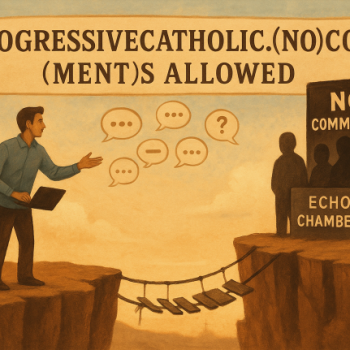GODSTUFF:
It’s time for a cease-fire in this war of words
And so this is Christmas
For weak and for strong
For rich and the poor ones
The road is so long
And so happy Christmas
For black and for white
For yellow and red ones
Let’s stop all the fight
— “Happy Christmas [War is Over]” by John Lennon
——————————————-
Because what we need right now is another war. Just like we need another natural disaster or one more permutation of “The Apprentice.”
Because we don’t have enough to worry and fret and fight about without Bill O’Reilly and his hyperactive imagination concocting a liberal humbug conspiracy and announcing that a Christ-less Christmas cabal has declared war on Baby Jesus and his birthday.
There isn’t. They haven’t.
A war is what’s happening in Iraq. And in Sudan.
Under siege is when gunmen seize a movie theater in Moscow, or when airliners fly into buildings in lower Manhattan.
Secularism isn’t an epidemic. But AIDS is. And ignorance.
Cultural chafing is not the equivalent of carpet bombing. “Happy Holidays” is not a hand grenade. Chrismukkah is not a weapon of mass destruction.
Christmas is just fine.
So is Baby Jesus.
While he appreciates the concern, he can take care of himself.
And he hates it when we fight. Especially about stupid sh . . . uh, stuff.
Like the alleged “War on Christmas,” for example.
Listen, I know we’re all a little touchy. It’s been a hell of a year. Again.
We’re weary. We’re nervous. We’re worried. And angry. And afraid.
I was talking to my rabbi about this the other day. Fine, so I’m not Jewish and he lives in New York and I’ve never been to his synagogue, so he’s not technically my rabbi. Still, that’s the way I like to think of him.
Rabbi means “teacher.” And Rabbi Irwin Kula has taught me many things. He is a wise man, irreverent and sensitive, profound and menschy.
The last time the rabbi and I had a long chat was nearly three years ago, right after the war in Iraq began.
During that conversation, when we were both so distressed about the war for myriad reasons, Kula taught me how the people you perceive as your enemies, the people most unlike you (at least in your mind), can teach you the most about yourself. It’s a hard lesson that I’m still trying to learn, but he planted the seed.
I have to wonder, amidst all this “War on Christmas” bunk, whether the heart of the matter — as false as O’Reilly’s conceit may be — is spiritual or something else.
When we get down to it, we’re talking about labels. Christmas versus Holiday versus Hanukkah versus Chrismukkah versus Yule versus Kwanzaa versus Frosty the Snowman.
I can’t help but think that, for some of us, having the words “Merry Christmas” or “Happy Hanukkah” replaced by “Happy Holidays” is like having part of our identity stripped away. We define ourselves by a list of things we are or aren’t. I’m a Christian, so I celebrate Christmas. Irwin is a Jew, so he celebrates Hanukkah. My friend Kareem is a Muslim, so he celebrates neither.
When someone starts peeling off the labels, we get grabby and defensive. It’s as if we feel that words can protect us, physically insulating us from a dangerous world.
They cannot.
And saying “Merry Christmas” to a Jew or “Happy Hanukkah” to a Muslim won’t leave a mark. Or draw blood.
In my experience, when people say “Happy” or “Merry” whatever, they are just trying to wish the other person well during a period of darkness — literally and figuratively. We’ve just passed the winter solstice. It’s dark. And cold. And, for many of us, lonely.
“Happy Holidays” is a blessing. Not a curse.
But for some people, it feels like a declaration of war against who they are.
“Everything is happening and that’s very unnerving,” Kula was telling me earlier this week. “When everything is happening, there’s proof for any view regarding what’s happening right now.
“You want to prove that the whole world is under siege? You can prove that. You want to prove that we’re at the end of civilization? We can prove that. You want to prove that it’s one of the greatest global interconnective moments in history? We can prove that. You want to prove that religion is really, really evil? We can prove that. You want to prove that religion is capable of so much amazing affirmation of life? We can prove that.
“So really, everything can be proven right now and that’s what it means to live in a really significant, almost epic moment of change,” said Kula. Kula is president of CLAL-The National Jewish Center for Learning and Leadership in New York City, co-founder of the Aitz Hayim Center for Jewish Living in Chicago, and host of the PBS show, “Simple Wisdom.”
“The paradox and the interesting thing for me is that that is exactly the psychological moment that produced the very wisdom traditions that we all value, whether it’s Judaism, Christianity, Buddhism,” he said. “In many ways, we are living in very similar times. The institutions, the ways of believing, behaving and belonging that rooted people and gave people a kind of stability, were breaking down. And that’s exactly when we asked the big questions of who we want to be in this world and what the purpose of our life is.
“Are hope and love and the intangible things that can’t be measured real? That is where we are now,” the rabbi said.
Here’s the thing: Christmas and Hanukkah and whatever else people might be celebrating this time of the year, commemorate different things religiously and historically, but they all have the same message.
Somehow light will shine again in the darkness. The darkness outside in the December cold. The darkness in our hearts and souls.
“What we know is that right now, underground, the sap is sapping already,” Kula said. “Life is happening even though we’re not aware of it yet. Because in April, no matter what, things will bloom.”
So instead of perpetuating the myth of a war on Christmas, try to spread some light. In your own life. In someone else’s. Wish them happiness and joy and peace and love. Declare the peace on Christmas. And Hanukkah. And for the New Year.
War is over
If you want it
War is over now.
Copyright © The Sun-Times Company
All rights reserved. This material may not be published, broadcast, rewritten, or redistributed.















